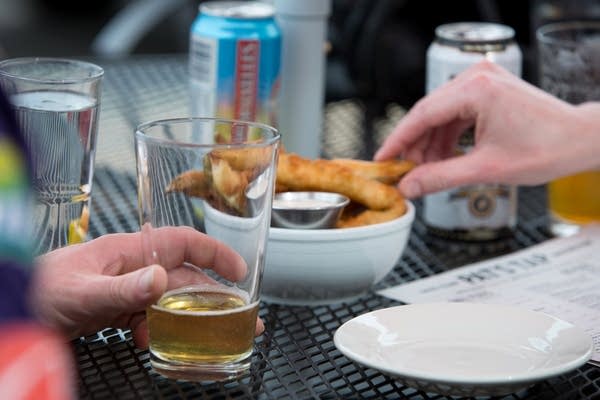Balancing booze: Mpls. voters will decide whether to ease restaurant alcohol restrictions

Go Deeper.
Create an account or log in to save stories.
Like this?
Thanks for liking this story! We have added it to a list of your favorite stories.
Minneapolis voters will get a chance to decide this fall whether to remove restrictions on the amount of alcohol some city restaurants are allowed to sell.
The Minneapolis Charter Commission last night moved to hold a referendum on the so-called 70-30 rule, which says restaurants in residential neighborhoods have to make the bulk of their revenue selling food. The rule, which applies to about 70 restaurants nestled in residential areas, caps alcohol sales at 30 percent of revenue.
The ballot question is part of a larger movement to restructure the city's alcohol regulations.
The owner of Pat's Tap on Nicollet Avenue in south Minneapolis is among those hoping for a change. The ratio at Pat's Tap supposed to be 60 percent food, 40 percent alcohol. At some of Kim Bartmann's other restaurants, alcohol sales aren't allowed to exceed 30 percent of revenues.
Turn Up Your Support
MPR News helps you turn down the noise and build shared understanding. Turn up your support for this public resource and keep trusted journalism accessible to all.
"I'm not in charge of the world commodity scene, so I can't control my alcohol prices, my micro-brew prices, the price of corn and barley. And I certainly can't control the price of beef and pork and chicken. So those percentages just don't make sense, and they don't accomplish what they set out to accomplish," Bartman said.
Map shows Minneapolis restaurant alcohol ratio rules. Red: alcohol capped at 30 percent of revenue; Yellow: 40 percent of revenue
Kevin Scott, who had just ordered his third beer at Pat's Tap, along with some curried mussels and zucchini cakes, wondered if the pub had just broken the law: booze made up more than half his tab.
"I would guess my drinks were 15 bucks, and my food was ten bucks," he said.
There's nothing illegal about having one patron spend more on booze than food. But trouble is he's not the only one, Bartmann said, and that messes up her ratio.
"We are currently running afoul of the ratio at around 50-50."
Bartmann isn't the only business owner struggling with the percentages. Over the last four years, Minneapolis has issued about 50 citations for restaurants that exceeded them.

City Council Member Elizabeth Glidden says as the dining public gravitates toward pricier craft beers, fancy cocktails, and high-end wine, it's become tougher for restaurants to comply with limits on alcohol revenue.
"The fact that you can't meet that may not mean that you are a bad restaurant or are not managing things properly. It says to us as the city, is there another mechanism that is workable, that makes sure restaurants are acting like good neighbors, that is modernized."
Glidden is co-sponsoring a proposal to do away with the ratios altogether. It will include a new way of differentiating restaurants from bars, and it will set standards designed to ensure the staff are well-trained and the businesses are managed responsibly.
The council can easily repeal the limits for restaurants like Pat's Tap whose alcohol sales are currently capped at 40 percent of revenue. But about 70 restaurants face an even stiffer 30 percent restriction set forth in the City Charter. Removing that ratio will take a referendum, which will appear on the ballot this November, thanks to last night's Charter Commission vote.
Charter Commissioner Todd Ferrara says he supports lifting the restrictions, even though as a neighborhood activists in the 1980's he fought hard to keep his neighborhood dry.

"People were afraid that alcohol would affect their neighborhoods in a very adverse way. Now the community, our society and restaurants have changed."
Ferrara says alcohol carries far less stigma than it used to. The charter commission vote was unanimous. Only one person spoke against the move at a public hearing, and 14 neighborhood groups have passed resolutions supporting the repeal.
The lack of opposition surprises Traci Toomey. She's an epidemiologist at the University of Minnesota and she specializes in alcohol policy. Toomey says it's easy to predict what will likely if happen if the city reduces restrictions.
"My guess is more alcohol is going to be sold, and if we increase availability of alcohol, we probably will increase problems."
Toomey says what's happening in Minneapolis is part of a national trend toward less alcohol regulation. Statistics show alcohol consumption has been on the rise since the mid 1990's. It's a trend she sees as troubling.




